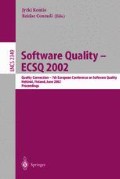Abstract
Software process improvement is often defined and framed by general maturity models such as CMM or SPICE. Those models are applicable over a wide range of companies and contexts. However, specific experiences can make important contributions of a different kind to process improvement. It may not be obvious, though, how experience-based elements can be effectively integrated into software process improvement activities. At DaimlerChrysler, we have applied experience-based concepts to software process improvement for a number of years. During that time, we learned many lessons about experience-based PI approaches that were more or less successful. In this paper, a number of areas are described in which experiences can be highly advantageous to use. The exploitation of experiences is deeply ingrained into PI activities and goes beyond experience package writing and publishing in a database or a web-tool. Risk management is used as process improvement example from practice.
Access this chapter
Tax calculation will be finalised at checkout
Purchases are for personal use only
Preview
Unable to display preview. Download preview PDF.
References
Paulk, M.C., et al., The Capability Maturity Model: Guidelines for Improving the Software Process. 1 ed. SEI Series in Software Engineering, ed. M.C. Paulk, et al. Vol. 1. 1994, Reading, Massachusetts: Addison Wesley Longman, Inc. 441.
CMU-SEI, Software Acquisition Capability Maturity Model (SA-CMM),. 1996, Carnegie Mellon University, Software Engineering Institute.
Daskalantonakis, M., Achieving higher SEI levels, in IEEE Software. 1994. p. 17–24.
Schneider, K. LIDs: A Light-Weight Approach to Experience Elicitation and Reuse. in PROFES 2000. Oulo, Finland: Springer.
Schneider, K. and T. Schwinn, Maturing Experience Base Concepts at DaimlerChrysler. Software Process Improvement and Practice, 2001. 6: p. 85–96.
Schneider, K. Experience-based Training and Learning as a Basis for Continuous SPI. in European SEPG. 2001. Amsterdam.
Basili, V., G. Caldiera, and D.H. Rombach, The Experience Factory. Encyclopedia of Software Engineering. 1994: John Wiley and Sons.
Basili, V., G. Caldiera, and H. Rombach, Goal question metric paradigm, in Encyclopedia of Software Engineering, J.J. Marciniak, Editor. 1994, John Wiley & Sons: New York. p. 528–532.
Basili, V.R., et al. The Software Engineering Laboratory-An operational Software Experience Factory, in 14th Int. Conf.e on Software Engineering (ICSE’92). 1992.
Houdek, F. and K. Schneider, Software Experience Center. The Evolution of the Experience Factory Concept, in International NASA-SEL Workshop. 1999.
Landes, D., K. Schneider, and F. Houdek, Organizational Learning and Experience Documentation in Industrial Software Projects. International Journal on Human-Computer Studies (IJHCS), 1999. 51 (Organizational Memories).
Fletcher, I. and G. Urqhart. Process Engineering for Rapid Growth, in SPI99 conference. 1999. Barcelona, Spain.
Schneider, K. Active Probes: Synergy in Experience-Based Process Improvement, in PROFES 2000. Oulo, Finland: Springer.
Macaulay, L.A., Requirements Engineering. 1995: Springer.
Hall, E.M., Managing Risk: Methods for Software Systems Development. 1997, Reading, MA: Addison-Wesley.
Kontio, J., G. Getto, and D. Landes. Experiences in improving risk management processes using the concepts of the Riskit method, in 6th International Symposium on the Foundations of Software Engineering (FSE-6). 1998.
Freedman, D.P. and G.M. Weinberg, Handbook of Walkthroughs, Inspections, and Technical Reviews-Evaluating Programs. Projects, and Products. 1982, Boston, Toronto: Little, Brown and Company.
ISERN, Meeting of the International Software Engineering Research Network (ISERN) in Oulo, Finland, June 1999., 1999.
Birk, A. and F. Kröschel. A Knowledge Management Lifecycle for Experience Packages on Software Engineering Technologies. in Workshop on Learning Software Organizations. 1999. Kaiserslautern, Germany.
Kontio, J., Software Engineering Risk Management-A Method, Improvement Framework, and Empirical Evaluation, in Department of Computer Science and Engineering. 2001, Helsinki University of Technology: Helsinki, p. 248.
Stamatis, D.H., Failure Mode and Effect Analysis: FMEA from Theory to Execution. 1995: Amer Society for Quality.
Author information
Authors and Affiliations
Editor information
Editors and Affiliations
Rights and permissions
Copyright information
© 2002 Springer-Verlag Berlin Heidelberg
About this paper
Cite this paper
Schneider, K. (2002). Experience Based Process Improvement. In: Kontio, J., Conradi, R. (eds) Software Quality — ECSQ 2002. ECSQ 2002. Lecture Notes in Computer Science, vol 2349. Springer, Berlin, Heidelberg. https://doi.org/10.1007/3-540-47984-8_15
Download citation
DOI: https://doi.org/10.1007/3-540-47984-8_15
Published:
Publisher Name: Springer, Berlin, Heidelberg
Print ISBN: 978-3-540-43749-9
Online ISBN: 978-3-540-47984-0
eBook Packages: Springer Book Archive

